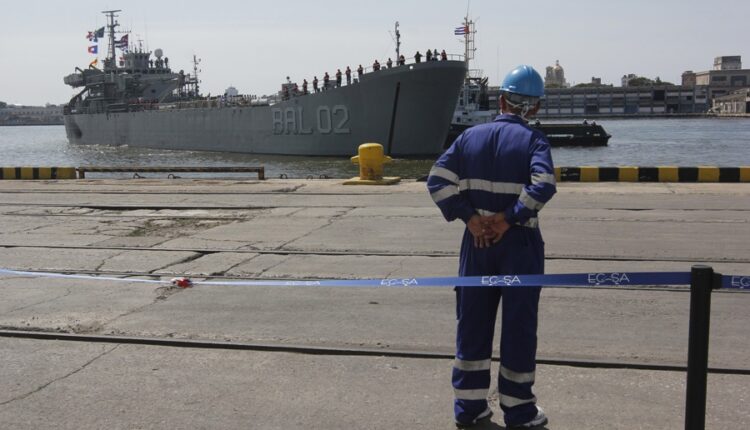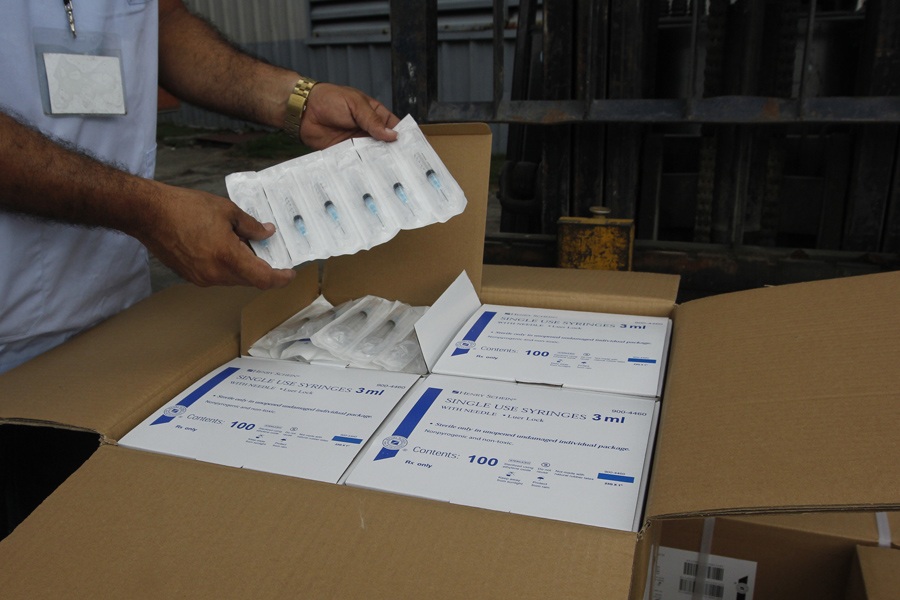
International aid helps Cuba in the face of its multiple crises
By Luis Brizuela / IPS
Cuba has received food, medicine and supplies donated by governments, international organizations and solidarity groups in answer to a particularly complex political, economic and social scenario — the July 11 protests and the moment of greatest impact of Covid-19.
Agencies, programs and funds of the United Nations system, as well as international cooperation agencies that work in the country are supporting the Cuban public health services, as well as the anti-Sars Cov-2 immunization process that the island carries out with its own vaccines.
“Managing an effective response to the pandemic by avoiding obstacles acquiring supplies or carrying out financial operations, makes the ability of any country to control the health crisis much more complex,” said Elena Gentili, director of the Cuban office of the international humanitarian organization Oxfam.
This situation affects people’s lives and “their opportunities to protect themselves, feed themselves, get vaccinated and be able to leave behind, without major consequences, this latest wave of infections, much more intense and difficult to control than the previous ones,” she said in an interview with Inter Press Services (IPS).
For this reason “Oxfam has the duty to work in favor of the lives of more than 11 million Cuban men and women,” underscored the director of the humanitarian institution present on the island for 28 years, and with contributions of supplies for the protection and hygiene of medical personnel and people in hospitals and other institutions.
Gentili stated that this Caribbean country “is the only one that entered the pandemic after decades of facing unilateral measures imposed by the United States … which has inevitably also impacted the lives of the Cuban population.”
This context of deficiencies, especially in food and medicine, was one of the reasons for the social outbreak of July 11, with protests in Havana and other cities and towns in the country. The demonstrations also highlighted the precariousness in which part of the population currently lives and triggered different expressions of solidarity from the international community.
Calls against the embargo
On July 14, a statement issued by Oxfam called on the administration of President Joe Biden to eliminate the sanctions imposed by his predecessor “that today impede an effective and timely response to meet the humanitarian needs of the Cuban people.”
The more than two hundred measures ordered by Donald Trump hit essential sources of income such as tourism, remittances and the provision of services, which together with the effects of the pandemic in 2020 caused a contraction of almost 11 percent of the Island’s gross domestic product (GDP).
According to the Cuban authorities, the embargo that Washington has maintained against Havana since 1962 constitutes the main obstacle to national development and causes additional hardships for citizens.
 On July 29, a coalition of 37 American civil society organizations, foundations and academics sent a letter to Biden urging him to remove regulations that obstruct unlimited remittances, specific licenses to use medical supplies, as well as on-site verifications that discourage the sending of humanitarian aid to Cuba by NGOs.
On July 29, a coalition of 37 American civil society organizations, foundations and academics sent a letter to Biden urging him to remove regulations that obstruct unlimited remittances, specific licenses to use medical supplies, as well as on-site verifications that discourage the sending of humanitarian aid to Cuba by NGOs.
Two days earlier, the organization Cuban Americans for Engagement (CAFE) announced a project of collaboration with community projects in Havana for the shipment of medicines. “Regulations imposed by the embargo, in general, have had a devastating impact on Cuban women and men, but these latest sanctions, amid the pandemic, reach an extreme in inhumanity and cruelty,” said María Isabel Alfonso from New York, a CAFE founder and director. She is also a professor of Cuban and Latin American culture at St. Joseph’s College.
“With this initiative we are appealing to the goodwill of many who in the United States are sending us medicines and helping to pay for shipping costs,” added Alfonso.
Authorities from the Cuban Ministry of Foreign Trade and Foreign Investment confirmed, on July 31, the arrival of 30 high-performance lung ventilators donated by the Chinese government in advance of a larger shipment of equipment and other products to counteract the coronavirus.
Meanwhile, solidarity groups and Cubans residing in Italy, France, the United Kingdom, Canada, the United States, Jamaica and Panama, among other nations, have sent syringes, needles, medicines, and sanitary instruments to the island.
Solidarity
Until this Tuesday, Aug. 3, donations from the governments of Russia, Bolivia, Venezuela and Mexico, among the most recent, have arrived in Havana, while Vietnam confirmed the shipment of 12,000 tons of rice.
Since July 30, some of the donated products such as rice, sugar, legumes, pasta, edible oil, canned food, powdered milk and wheat flour have been distributed free of charge, benefiting some 3.8 million households in the 168 Cuban municipalities.
“We are grateful to the countries that have reached out to us. The aid is important and alleviates the difficult situation of access to basic food,” said Eugenia Flores, a resident of the Havana municipality of La Lisa, the first to receive the donated products.
Donations arrived after months of a marked shortage as a result of the worsening crisis that the country has faced since the 1990s; a lack of liquidity to import sufficient quantities of food; and a domestic economy that barely produces 20 percent of what it consumes.
At the beginning of July a campaign was started on the social networks calling for the opening of a humanitarian corridor to Cuba, and even a humanitarian intervention, given the worsening of the covid virus in different provinces, such as in western Matanzas.
On July 10, during a press conference, Ernesto Soberón, director general of Consular Affairs and Cuban Residents Abroad, of the Ministry of Foreign Affairs, rejected this offer, calling them “concepts and terms related to situations of armed conflicts, and serious violations of international humanitarian law” which did not apply to the country’s situation.
He pointed out that the island was open to receiving donations as long as they were coordinated through Cuban legal institutions, in accordance with current legislation on international cooperation.
Likewise, diplomats emphasized that the blockade — as the embargo is called [in Cuba] — is the main cause of the shortage of food and medicine.
Covid gains strength
Governmental authorities indicate that the donations support the services of hospitals and isolation centers in several of the 15 provinces that have seen their capacities reach their limit given the high number of infections since the beginning of the year and a very bad situation since April.
Until this Tuesday, the island had recorded 2,993 deaths and 413,251 positive patients from the coronavirus.
Data from the Pan American Health Organization (PAHO), on Monday, placed Cuba as the third nation in the Americas with the highest number of new cases — more than 9,000 a day in the last three days — only surpassed by Brazil and the United States.
Experts attribute this situation to the circulation of coronavirus strains like the highly contagious Delta variant; violations of sanitary protocols in institutions and families; as well as delays in PCR tests and transfers to isolation centers.
However, the island maintains the lowest fatality rate in the region with 0.7 percent — deaths with respect to people confirmed with covid.
The Oxfam country director said that since the beginning of the pandemic the organization “has advocated globally for universal and free vaccinations, disclose factors that increase inequalities and the need to take urgent measures so that each country can control the health crisis and contain the effects of the economic crisis.”
Although Cubans consulted by IPS recognize the importance of the donations, they feel it is urgent that the government accelerate the reform process of the socialist development model, agreed upon by a great majority in 2011, and which proposes to modernize the national economy.

